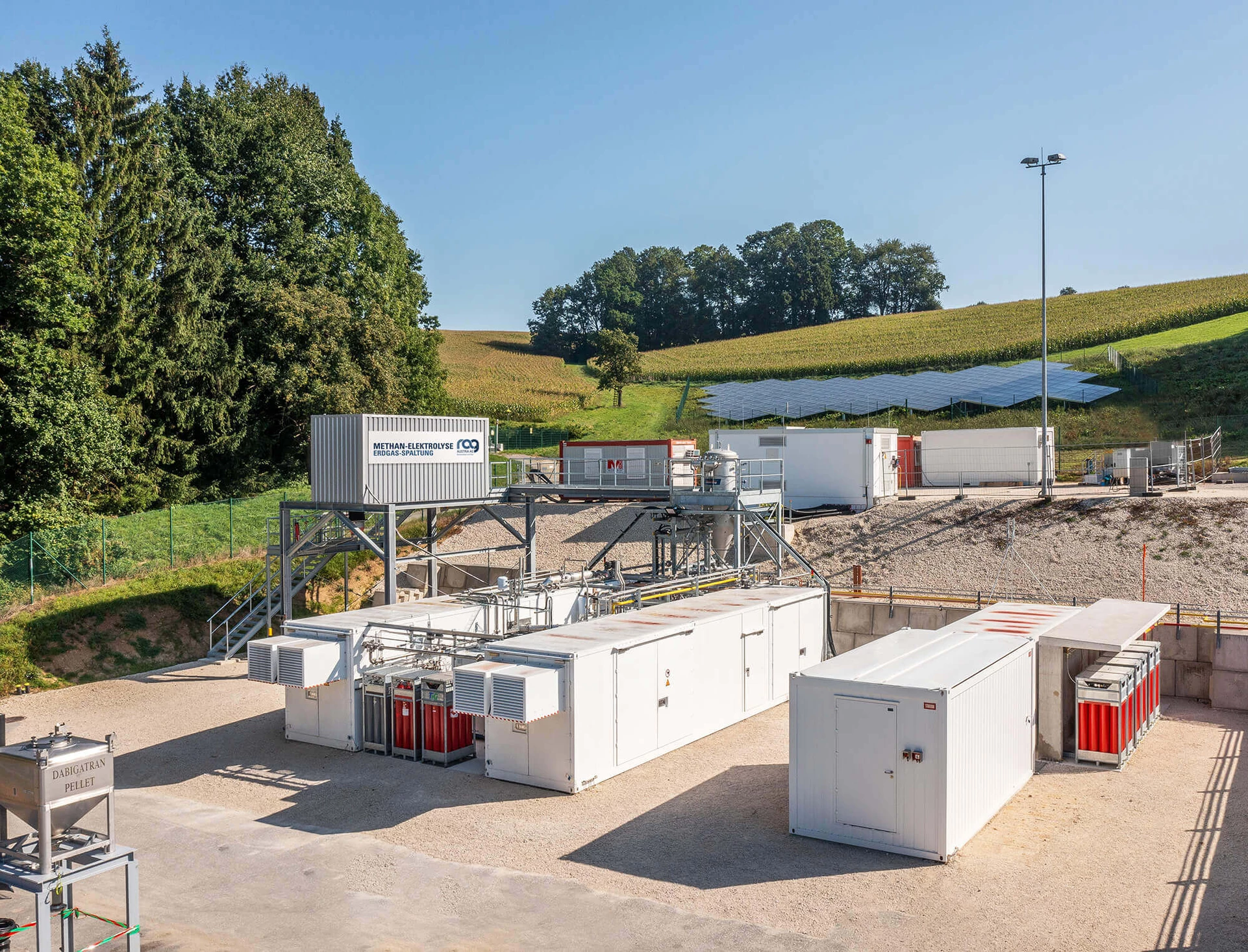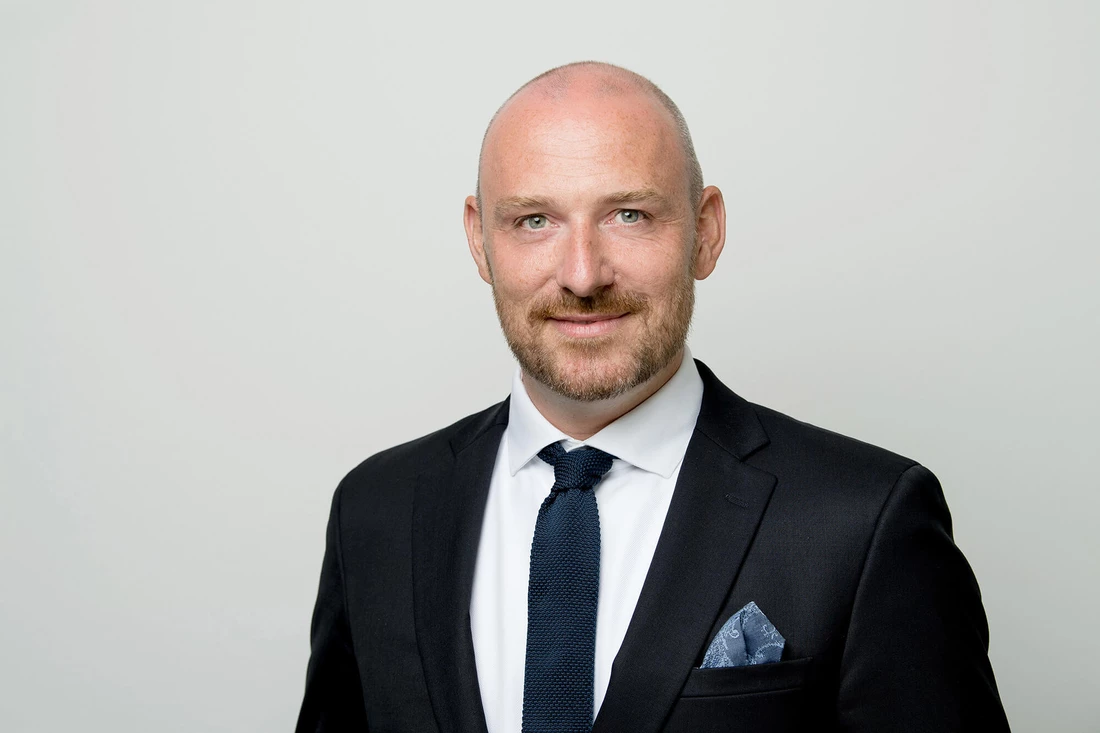Implementation of climate technology in Upper Austria
In the flagship region for 100% green energy supply, the RAG Energy Valley in Krift near Kremsmünster (Upper Austria), Austria's first methane electrolysis plant in an industrial environment is being put into operation today in the presence of Federal Minister Magnus Brunner, Head of Section Jürgen Schneider of the Federal Ministry of Culture and Labour and Upper Austrian State Councillor for Economic Affairs and Research Markus Achleitner. In future, this pioneering climate technology will be used at the Kremsmünster site to break down the raw material methane (natural gas) into hydrogen and high-purity, solid carbon without CO2 emissions using solar power. This climate-friendly energy and raw material innovation will not only provide storable and climate-neutral hydrogen from a single source, but also the currently scarce raw material "solid carbon", which is important for agriculture and other diverse uses in industry.
"Climate protection is one of the central tasks of our generation. Our goals are ambitious: 100% renewable electricity in and from Austria by 2030 and climate neutrality in Austria by 2040 – ten years ahead of the EU. To achieve these climate targets, we need investment, innovation and cooperation. In any case, we must not concentrate on just a few technologies, but must remain open to all technologies. With Austria's first demonstration plant that usesnatural gas without CO2 emissions for the production of hydrogen and solid, elemental carbon,RAG is focusing precisely on this openness to technology, which is so urgently needed: hydrogen makes an important contribution to year-round security of supply – at the same time, the high-quality carbon obtained is a valuable raw material for agriculture, batteries, computer chips and carbon fibres. A win-win situation for the climate and the location," says Mining Minister Magnus Brunner.
"In the RAG Energy Valley in Krift near Kremsmünster, we are demonstrating how regions and urban centres can be supplied with green energy all year round. In addition to the storage and production of hydrogen from water, the climate technology "methane electrolysis" is another key element and a milestone for the energy transition. The natural gas from our own domestic production is broken down into CO2-neutral solid carbon, which is important for agriculture and industry, and storable, climate-friendly hydrogenwith the help of solar power, which we also produce here on site," says Markus Mitteregger, CEO of RAG Austria AG , emphasising the importance of this pioneering technology.
A major advantage over alternative production methods for renewable hydrogen is the significantly lower energy consumption.
This innovative air conditioning technology was developed by Graforce GmbH from Berlin – it is being implemented and optimised on an industrial scale for the first time in Austria by RAG Austria AG. "Hydrogen is the key to a CO2-neutral economy. Our modular plants enable the production of CO2-free hydrogen with high efficiency and lower infrastructure costs. The technology we have developed closes important material cycles, enables key industries to achieve greater sustainability and climate protection and is economical at the same time. We are seeing great international interest in this technology and are delighted about the joint showcase project with RAG Austria," explains Jens Hanke, founder and Managing Director of Graforce GmbH.
Subsequently, the hydrogen produced can be stored seasonally in RAG energy storage facilities such as the "Underground Sun Storage" in Pilsbach and Gampern or used as industrial hydrogen. In the RAG H2 cogeneration plant (CHP) Krift near Kremsmünster, Austria's first 100% hydrogen power plant, this climate-neutral hydrogen is used for the RAG site's own electricity and heat supply. In the coming winters, the surplus energy can also be used to supply up to 800 households in the Kremsmünster region with green district heating and green electricity.
Solid carbon
Initial results on the agricultural use of carbon are available:
Due to intensive agricultural use in recent decades, up to 50% of the carbon in soils has been lost through erosion or humus loss. Climate change is adding further challenges, e.g. long periods of drought. The use of carbon from "methane electrolysis" offers great potential to improve soil quality and thus ensure sustainable agricultural production. Otherwise, there is a risk of massive crop failures in the coming decades, jeopardising food security. Our results from several glasshouse and field trials show that carbon improves plant nutrient availability and the drought stress resistance of plants. By adding nutrient-rich residues (e.g. compost or liquid manure), a valuable fertiliser can also be generated. In the next series of trials, the effect will be extended to different soil types and other crops, taking into account current and expected climate changes. Based on these promising research results, RAG and RWA (Raiffeisen Ware Austria) now intend to intensify the existing cooperation, especially in product development.
„In view of the current and future challenges posed by global change and global warming, carbon from methane electrolysis can make an important contribution to safeguarding soil quality and agricultural production," emphasises Markus Puschenreiter, University of Natural Resources and Life Sciences, Vienna.
High potential for a wide range of applications
Solid carbon is also a valuable raw material for the sustainable production of building structures, batteries, computer chips, carbon fibres and for the manufacture of carbon-based materials. They are used in numerous sectors such as medical technology, aerospace, sports and leisure and the high-tech industry.
A total of around 120 scientists at Montanuniversität Leoben are currently conducting research in this core research area. Since 2022, the numerous activities at 25 chairs have been centrally coordinated in the Strategic Core Research Area "Hydrogen and Carbon".
„The solid carbon produced during methane decomposition also opens up a wide range of new applications and fields of research, particularly for sustainable agriculture and forestry," says Peter Moser, Rector designate of Montanuniversität Leoben, enthusiastically about the ongoing development in this area. "The close cooperation with external partners such as RAG and BOKU enables the bundling of individual specialist competences and thus forms the basis for targeted and, above all, application-oriented research."
„Especially for Upper Austria as the No. 1 economic and industrial state, hydrogen is a decisive key factor in making the location even more fit for the future. It is therefore all the more pleasing that RAG is setting another milestone towards a CO2-neutral economyhere in Upper Austria at its 'Energy Valley' in Krift near Kremsmünster with the CO2-free production of hydrogen. Following the Underground Sun Storage in Rubensdorf/Gampern and the hydrogen cogeneration plant also in Krift near Kremsmünster, RAG is now launching Austria's first demo plant in which hydrogen and solid carbon are produced from natural gas using methane electrolysis without generating CO2 emissions. This demonstration plant is an important building block in the transformation of the energy system towards renewable sources. Our province in particular is actively driving this change with the Upper Austrian Hydrogen Offensive 2030 in the fields of transformation of energy-intensive industry, materials technologies and seasonal energy storage. Our own Upper Austrian hydrogen research centre will be launched in Wels in November, in which we will invest six million euros from the province of Upper Austria in the first implementation step," says Markus Achleitner, Upper Austrian Provincial Councillor for Economic Affairs and Research
„With a large number of extreme weather events such as heat waves and flooding, this summer has impressively demonstrated the need to implement rapid climate protection measures. In addition to the widespread implementation of existing technologies to reduce greenhouse gas emissions, this also requires research and innovation. Methane electrolysis technology is an option for producing climate-neutral hydrogen and – if biomethane is used – even has the potential for negative carbon emissions. The sustainable use of this elementary carbon is of crucial importance in terms of the complete utilisation of resources. On behalf of the BMK, a broad consortium led by the University of Leoben has analysed numerous aspects of this: The nature of carbon, its use in building materials and in agriculture as well as possible economic repercussions ," says Jürgen Schneider, Head of Section of Federal Ministry for Climate Protection
RAG Austria AG
RAG is Austria's largest energy storage company and one of Europe's leading technical storage operators. The company's main focus is the storage, conversion and needs-based conditioning of energy in the form of gaseous energy carriers. With its energy innovations and energy storage systems, RAG is living the vision of "sustainable energy mining".
As a partner of renewable energies, the company develops innovative and forward-looking energy technologies centred around green gas and hydrogen. In this way, RAG Austria AG is making an indispensable contribution to achieving Austria's ambitious climate targets and ensuring a sustainable supply of raw materials and energy. The aim is to provide our customers with safe, efficient, environmentally friendly and affordable energy and gas storage services in a long-term and responsible manner.
Graforce GmbH
Graforce is a German hydrogen technology company. Its Power-to-X plants produce CO2-free or CO2-negative hydrogen and synthetic raw materials - with maximum efficiency and lower infrastructure costs in the multi-megawatt range. Graforce is thus decarbonising fossil fuels, industries and the heating, transport and building sectors. The company is currently working on strategic partnerships to rapidly deploy its hydrogen technology worldwide.
www.graforce.com
University of Natural Resources and Life Sciences
The University of Natural Resources and Life Sciences, Vienna (BOKU) is one of Europe's leading sustainability universities. It plays a leading role in the exchange of science and students with society, business and politics and is concerned with the protection and improvement of livelihoods, the management of natural resources, food and health security as well as sustainable social and technical transformation. Research at the Institute of Soil Research focuses in particular on sustainable strategies in soil management with a special focus on fundamental soil processes and their interactions with the biosphere.
www.boku.ac.at
University of Leoben
The University of Leoben has been intensively involved in research topics relating to the two resources hydrogen and carbon for several years. A total of around 120 scientists at the University of Leoben are currently conducting research in this core research area. Since 2022, the numerous activities at 25 chairs have been centrally coordinated in the Strategic Core Research Area SCoRe A+ Hydrogen and Carbon. In addition to the promising potential uses of hydrogen as a raw material and energy carrier, research activities are focussing in particular on the production of hydrogen using methane pyrolysis. In addition, other key topics in the hydrogen value chain, such as the storage and distribution of hydrogen, are being further developed in research and demonstration projects with a view to industrial implementation.
www.unileoben.ac.at


